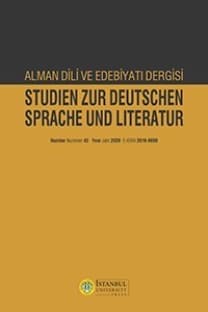Christian Kracht’ın 1979 Adlı Romanında Zaman ve Mekân İmgelerinin Dağılması
İsviçreli yazar Christian Kracht’ın 2001’de yayımlanan ikinci romanı 1979, Batı burjuva kültürüne zımni bir eleştiri niteliğini taşır. Gerek adı gerekse İran’ın başkenti Tahran’ı –özellikle de ilk bölümde– mekân olarak öne çıkarması dolayısıyla roman, doğrudan doğruya aynı tarihli İran İslam Devrimi’ni çağrıştırır. Kracht’ın romanı, Tahran’ı öncelikle modern bir kent olarak tarif eder. Bu doğrultuda Tahran’ı dünyanın dört bir yanından dekadan kesimlerin jet-set partiler düzenlediği bir kent olarak tanırız ve bu bilginin ışığında Tahran romanda, Doğu’nun özgül kimliğinden bağımsız, deyiş yerindeyse kültüraşırı bir mekân olarak karşımıza çıkar. Ne var ki tarih 1979’dur ve kent, toplumsal ve siyasi bir dönüşümün eşiğindedir. Bununla birlikte kentin, dolayısıyla da ülkenin politik bir yol ayrımında olması, bu romanın konusu değildir. Roman daha ziyade tam da darbenin eşiğinde bu kente gelen anonim bir ben-anlatıcı ile partneri Christopher’a odaklanır. İkili, dekadan kesimlerin dahil olduğu bir partiye katılmak üzere kenttedir. Batılı yaşam tarzını dejenerasyona uğramış biçimiyle teşhis ettiğimiz bu partiden sonra Christopher, kentin karanlık bir semtinde sefil bir hastanede ölür. Böylece 1979’un anonim başkişisi, halihazırda eşiğinde bulunduğu Batı’nın ötekisi olarak Doğu’ya doğru yola çıkar ve hep daha doğuya gider. Batı’dan uzaklaştıkça sadece Batılı kimliğiyle özne değil, özneyle birlikte uygarlık, kültür gibi aslen Batı’ya atfedilen kavramlar da ölür. Böylece 1979 sadece dünya tarihinde bir devrimin tarihi değil, kültürel birer gösterge olarak mekân ve zaman kavramlarının da çözünüp dağıldığı bir dönüm noktası haline gelir. Bu çalışma, Christian Kracht’ın 1979 adlı romanında bu savı tartışacaktır.
The Dissolution of Images of Space and Time in Christian Kracht’s Novel 1979
1979, the second novel of the Swiss writer Christian Kracht, published in 2001, is an implicit criticism of the culture of Western bourgeoisie. Both with its title and with its setting in Tehran, especially in the first part, the novel reminds us the 1979 Islamic Revolution in Iran from its start. Kracht’s novel depicts Tehran as a modern city. From this perspective, we get to know Tehran as a city where decadent people from all over the world organize jet-set parties, and in the light of this information Tehran as depicted in the novel emerges as a space which is beyond cultures and independent of Eastern identity. However, the date is 1979 and the city is on the threshold of social and political transformation. All in all, the novel does not mainly deal with the fact that city, hence the country, is at a political junction. The novel mainly focuses on an anonymous first person narrator and his partner Christopher who come to the city which is on the verge of the coup. They came to the city for a degenerate party of some degenerate people. After this party, which depicts the Western life style in its degenerated from, Christopher dies at a derelict hospital in one of the city’s dark neighbourhoods. Hence, the anonymous protagonist of 1979 decides to travel East as the other of the West. As one gets further away from the West, not only the subject with its Western identity, but all other concepts ascribed to the West also die. Hence, 1979 does not only pinpoint the beginning of a coup in world history, but the novel emerges as a turning point where concepts of space and time are also dissolved as cultural signifiers. The present study expounds on this argument in relation to Christian Kracht’s novel 1979.
___
Birgfeld, Johannes (2007): „Christian Kracht als Modellfall einer Reiseliteratur des globalisierten Zeitalters“, in: Jean-Marie Valentin (Hrsg.): Akten des XI. Internationalen Germanistikkongresses Paris 2005: Germanistik im Konflikt der Kulturen. Band 9: Divergente Kulturräume der Literatur, S. 405-411. Boberski, Heiner (2004): Adieu, Spassgesellschaft. Wollen wir zu Tode amüsieren?, Klosterneuburg: Edition Va Bene. Brooker, Peter/Andrew Tacker (2005): „Locating the modern“, in: Peter Brooker/Andrew Thacker (Hrsg.): Geographies of Modernism. Literatures, cultures, spaces, S. 1-5. Huyssen, Andreas (2005): „Geographies of modernism in a globalizing world“, in: Peter Brooker/Andrew Thacker (Hrsg.): Geographies of Modernism. Literatures, cultures, spaces, S. 6-19. Kracht, Christian (32013 [2001]): 1979. Ein Roman. Frankfurt am Main: Fischer Taschenbuch Verlag. Leipprand, Eva (2001): „Christian Kracht schreibt einen ziemlich paradoxen Roman“, online unter http://literaturkritik.de/public/rezension.php?rez_id=4336 [07.10.2016] Schulze, Gerhard (1993): Die Erlebnisgesellschaft. Kultursoziologie der Gegenwart. Frankfurt am Main: Campus Verlag.Vilas-Boas, Gonçalo (2007): „Krachts 1979: ein Roman der Entmythisierungen“, in: E. Platen/M. Todtenhaupt (Hrsg.): Mythisierungen, Entmythisierungen, Remythisierungen. Zur Darstellung von Zeitgeschichte in deutschsprachiger Gegenwartsliteratur, S. 82-96.
- Başlangıç: 1954
- Yayıncı: İstanbul Üniversitesi
